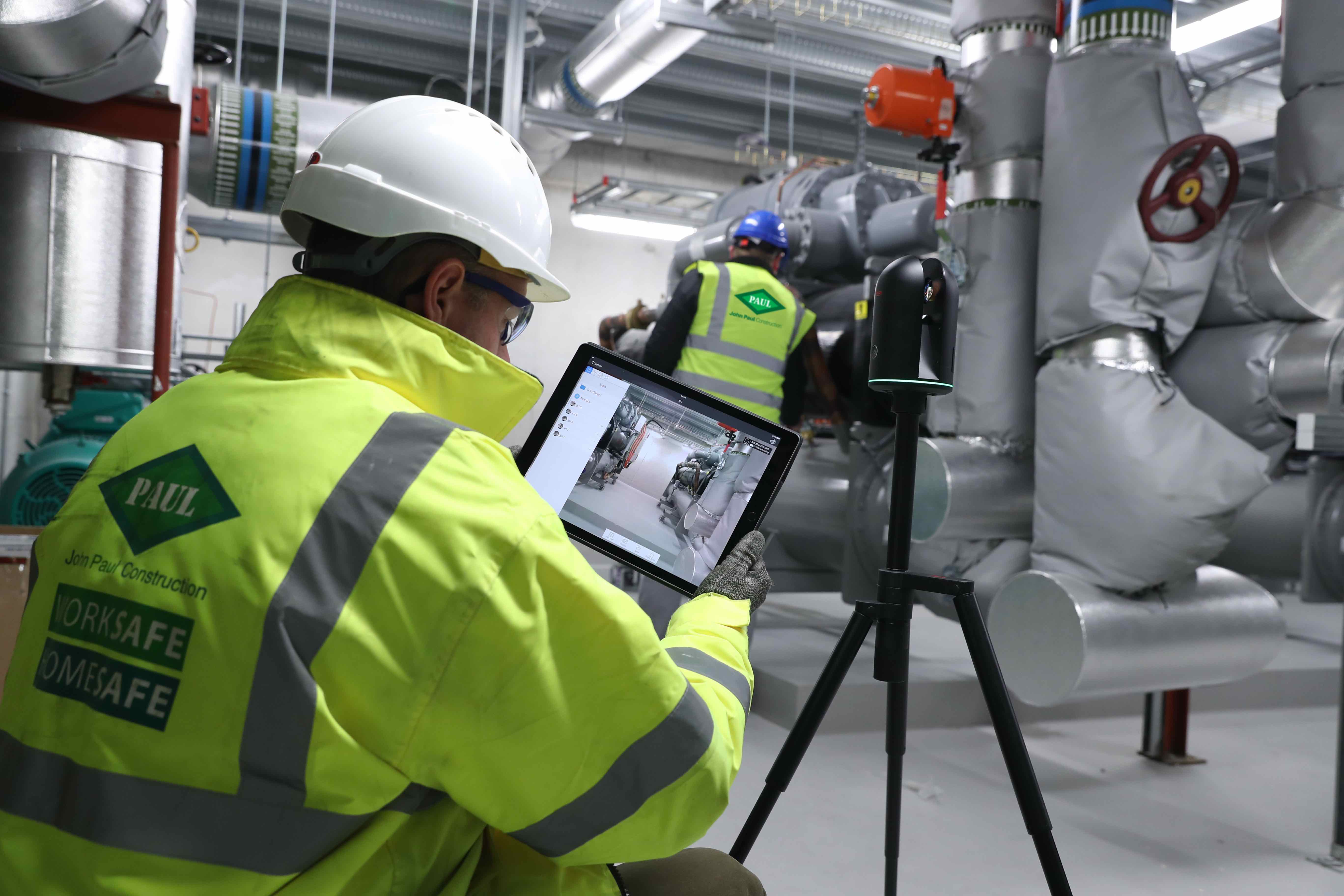
In recent years the mission critical sector has become a key focus area for John Paul Construction, contributing significantly to overall company turnover in recent years, as well as providing a platform for further growth both in the domestic Irish market and internationally.
Founded on over 70 years of deep engineering knowledge and quality relationship management, John Paul Construction is a leader in all sectors of the Irish construction industry. Their first project in the mission critical sector was completed in 2014, an 18MW high-capacity data centre, delivered to a very challenging fast track programme, for a global hyperscale client.
This marked the beginning of John Paul Construction’s data centre journey, with the company going on to deliver multiple data centre projects in Ireland, the UK and the Middle East for the hyperscale sector ranging from large scale new build high-capacity data centres, smaller containerised data centre solutions, retrofitting and upgrades to existing data centre facilities, and construction of new HV substation infrastructure to support new data centre development. Critical to their successful delivery approach is the ability of the company to leverage on the expertise of their teams across all aspects of project delivery, whether that be utilising the knowledge of the company’s in-house civil engineering teams at commencement of a project, or the in-depth experience of their M&E teams at the commissioning stage.
Over the years John Paul Construction have been involved in the construction of multiple new high voltage substation projects facilitating the power required for new data centre developments. These include the construction of a number of 110kV and 220kV substations, of which several have been delivered as full turnkey design and build projects.
“Growth in the mission critical sector is a key strategic objective for John Paul Construction. In a bid to expand our client base and support existing clients in Europe, we have established new offices in the Netherlands focusing on mission critical and life science projects,” says Gary Howard, Associate Director Mission Critical.
“Our work-winning teams have commenced tendering projects and look forward to initiating works on the ground this year. Providing delivery excellence for clients in different markets to the same exacting standards is a key part of our strategic plan.”

Technology & Innovation
John Paul Construction has been at the forefront of construction technology for many years, constantly improving the quality of its project management systems and project delivery methods utilising the latest digital technology. This is highly evident in how they deliver projects in the mission critical sector. The company continues to develop its Virtual Design and Construction (VDC) systems and processes, which are built around the three pillars of improved efficiency, better decision making and better sharing and communication of information.
“These processes and procedures ensure a leaner, more efficient delivery approach is achieved, guaranteeing enhanced value for clients. The biggest benefit is how they now enable us to work cohesively with all project stakeholders to facilitate quicker and better decision making along all stages of the project life cycle and thus mitigating project risk,” says Howard.
The company utilises 3D-model information for the development of logistics, management of safety, clash detection, project communication and planning. Their use of drone technology and laser scanners has also been expanded to support projects, providing point-cloud scans for as-built verification, improving design coordination and the certainty of delivery to clients.
“The use of 360o cameras for the completion of site walks has proved invaluable to projects for the monitoring of progress and project visualisation for remote working. The harvesting and presentation of metrics in dashboard format has become a key tool for the firm’s construction management teams and will continue to be a core focus in the future to improve decision making,” notes Howard.
Modular Construction
John Paul Construction strives to build smarter to improve the quality and efficiency of construction delivery, bringing additional programme and commercial value to clients. Central to this approach is the wider development of modern methods of construction – maximising the use of off-site fabrication where possible.
The use of modular construction on their mission critical projects allows John Paul Construction to take large components of the build off-site and increase fabrication in a factory-controlled environment. This is made possible through the strong long-term relationships that the company has established with the supply chain in this sector.
Examples of some of the modular components utilised on their data centre projects include containerised switchrooms, precast elements, data hall racking systems to aid fast top-down construction, modular plant rooms and modular containment sections for primary runs of cable and pipework. This ensures the production of these elements is streamlined from all angles, including design, assembly, and installation on-site.
“All elements of the off-site construction methods contribute directly to increased savings, enhanced quality, high standards of sustainable construction, zero material waste on-site, a greener footprint and a safer, more efficient workforce by reducing on-site labour requirements and numbers.” says Howard.
Owner Furnished – Contractor Installed (OFCI)
On mission critical projects, John Paul Construction aims to enhance the client journey by fully managing and supervising the complete scope of design, supply, installation and integration of client-supplied equipment and systems.
As the best path to success, the company advises an early procurement route, which allows them to be directly involved from design and procurement stages right through to delivery, installation, commissioning, and turnover.
The management of these vendors progresses and evolves through the complete life cycle of the company’s data centre projects. “On some of our projects we are now directly procuring and managing long-lead equipment through leveraging in-house capabilities and relationships with vendors,” notes Howard.
Challenges Ahead
The mission critical sector has grown rapidly in a relatively short time. This has led to pressure on the national grid, primarily in the Greater Dublin area, at a time where the conflict in Ukraine, utility constraints, supply chain issues and the planning system are causing great uncertainty in the market.
To combat this, limits have been implemented on where data centres can be built, as well as the potential requirement for operators to provide energy generation equivalent to their demand to reduce their reliance on the grid or to take themselves off it completely.
In addition, there has been a shift in focus to the generation of more renewable sources of energy; wind farms, battery storage facilities and gas generation plants – all of which will contribute to reducing the impact of data centres on the national grid and the environment.
“We realise we have an important role to play in improving sustainable construction in the industry. As part of our sustainability roadmap, we are continuing to manage our carbon footprint and environmental impact through initiatives such as, a changeover to energy-efficient plant, equipment and lighting, the transition to an electrical vehicle fleet and initiatives around biodiversity and water conservation,” says Howard.
“Through 2022 and 2023, we look forward to continuing to work with our current clients, design teams and supply chain partners to deliver these mission critical infrastructure projects and landmark developments to the highest standards both in Ireland and further afield, as we look to build on our international presence.”
If you would like an exciting career with John Paul Construction as part of our mission critical team, please visit our website www.johnpaul.ie
